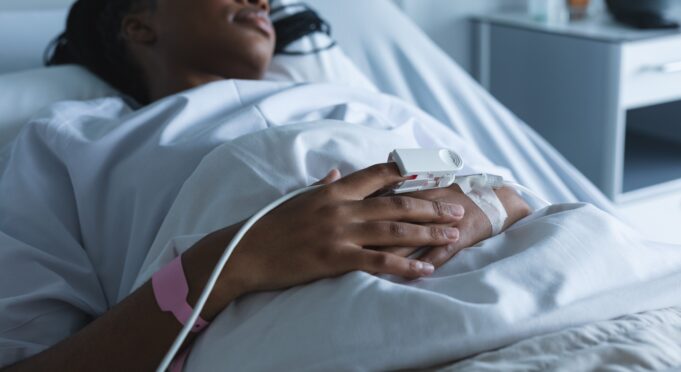The horrible history of medical malpractice, experimentation and excess deaths Blacks have suffered at the hands of doctors and researchers is long and appalling.
But it is not just yesterday: Three recent studies released by the American Association of Anesthesiologists (ASA) reveal Black trauma patients are less likely to be flown to facilities for life-saving treatment, Blacks die more often after heart surgery and Blacks are less likely to receive a proper regimen of drugs for pain relief after major surgeries.
The studies were released during the group’s October conference in Philadelphia. Anesthesiologists are doctors who specialize in sedation, sensation and pain medication, especially during surgery.

According to the organization, “Severely injured Black, Asian and Hispanic children and adults are less likely than White patients to receive critical helicopter ambulance services, which can make the difference between life and death.”
The organization says this is the first study to spotlight the differences and racial disparities in the use of helicopter ambulance transport after severe trauma.
“Traumatic injuries, such as those from vehicle or fall-related accidents and violent attacks, are a leading cause of death in the United States among children and adults.
“Patients with serious injuries who require urgent surgery or admission to the intensive care unit (ICU) should be taken to a hospital that provides the highest level of trauma care,” said ASA.
“Severely injured patients are more likely to survive if they get the right care within the ‘golden hour,’ the critical first hour after the trauma,” explained Christian Mpody, M.D., Ph.D., lead author of the study and anesthesiology resident at Montefiore Medical Center, New York.
Helicopter ambulance programs “have yet to result in equitable care for patients of different races and ethnicities,” said Dr. Mpody.
“Overall, they found transport via helicopter ambulance was associated with a statistically significant higher rate of survival: 82.4 percent of patients transported by helicopter ambulance survived vs. 80.6 percent of those transported by ground ambulance.
“They also found statistically significant evidence that race and ethnicity play a role in whether a trauma patient received helicopter transport—particularly among Black patients—and determined that the numbers didn’t improve over the five years of the study.
“Overall: White adults were twice as likely to be air transported compared to Black adults (25.4 percent of White adults were air transported vs. 12.6 percent of Black adults).
“White children were 50 percent more likely to be air transported compared to Black children (33.6 percent of White children were air transported vs. 20 percent of Black children.)
“When it comes to disparities, we need to do the opposite of ‘see no evil, hear no evil, speak no evil’—we must see it, hear it and speak out to fix it,” said Dr. Mpody.
“Despite advances in cardiovascular medicine, Black patients are 22 percent more likely than White patients to die in the hospital after coronary artery bypass grafting surgery, according to a study of more than 1 million patients,” said ASA.
Vinicius Moreira, M.D., lead author of the study and chief anesthesiology resident at Advocate Illinois Masonic Medical Center, Chicago, said, “We found Black patients who have coronary artery bypass surgery experience higher rates of severe postoperative complications, including death and cardiac arrest.”
“Researchers determined that 2.4 percent of White, 2.5 percent of Hispanic and 3.2 percent of Black coronary artery bypass grafting patients died in the hospital. Compared to White patients:
· Black patients were 22 percent more likely to die in the hospital.
· Black patients stayed in the hospital 1.5 days longer on average.
· Black patients had a 23 percent higher rate of cardiac arrest.
· Total hospital costs were $23,000 higher for Black patients.
“Coronary arteries can be clogged due to plaque buildup, restricting blood flow to the heart and leading to chest pain, shortness of breath, and, in some cases, heart attack.
“Coronary artery bypass grafting is a surgical procedure that takes a healthy blood vessel (usually from the leg, chest or arm) and attaches it to the aorta and the coronary artery just beyond the blockage so blood can flow to the heart,” ASA explained.
“While advances in cardiovascular medicine, such as minimally invasive cardiac procedures and modern mechanical circulatory support devices have increased life expectancy, our research suggests Black patients are less likely to have access to them.
For example, we found that compared to White patients, a lower proportion of Black patients had bypass surgery when it was indicated,” said Dr. Moreira.
Multimodal analgesia, using several types of meds to reduce pain, is more effective at treating pain after surgery than one medicine, according to experts.
“Black patients were 29 percent less likely than White patients to receive multimodal anesthesia using a combination of four drugs. Additionally, while almost all patients received at least one dose of an opioid intravenously (IV), Black patients were 74 percent more likely than White patients to receive oral opioids in addition to IV opioids.”
“We know that multimodal analgesia provides more effective pain management with less need for opioids, which are highly addictive,” said Niloufar Masoudi, M.D., MPH, lead author of the study, anesthesiologist and research assistant at Johns Hopkins University, Baltimore.
“Several factors may have contributed to the disparity, including differences in pain reported by the patient, patient preferences for or against a form of pain management and practitioner bias for or against forms of pain management by race,” Dr. Masoudi said.
Further research is needed but Dr. Masoudi stressed, pain specialists need to understand the benefits of using multiple drugs to treat pain and face up to disparities in its use.
Naba’a Muhammad is editor-in-chief of The Final Call newspaper. He can be reached via www.finalcall.com and [email protected]. Find him on Facebook. Follow @Rmfinalcall on X and Instagram.













